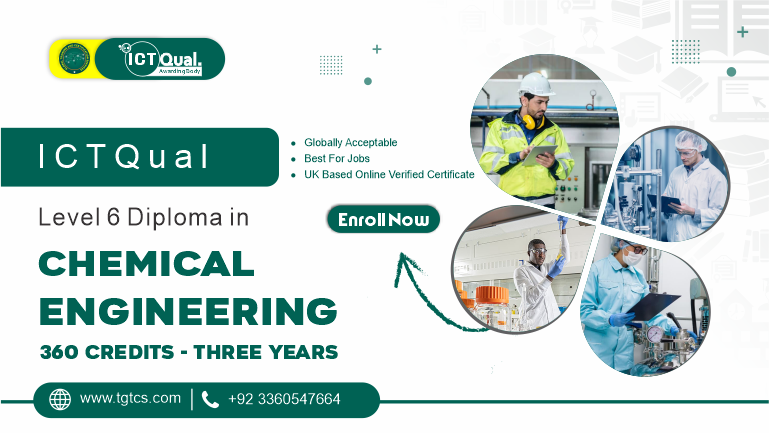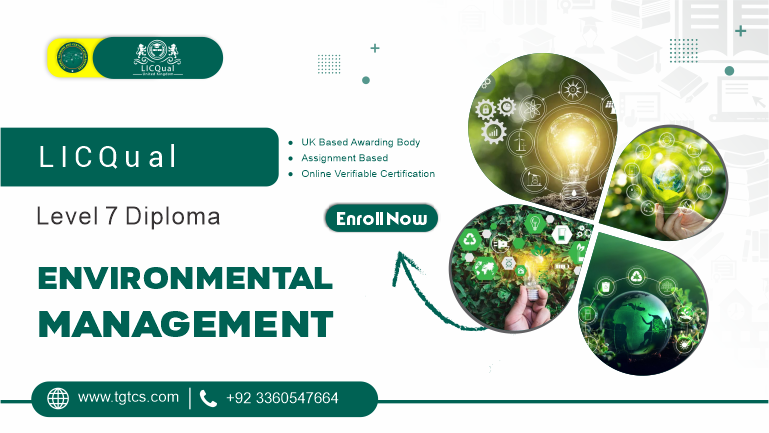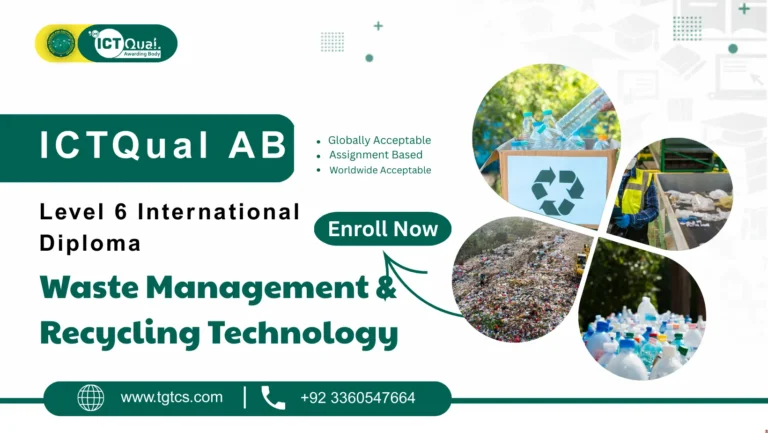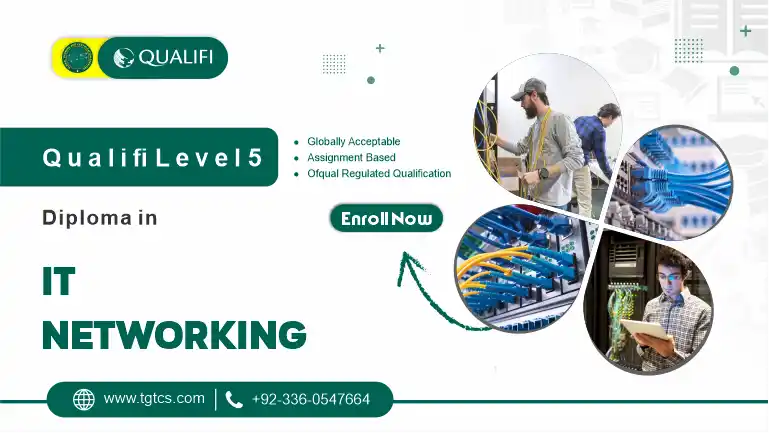ICTQual Level 3 Diploma in Chemical Engineering 60 Credits – 6 Months
The ICTQual Level 3 Diploma in Chemical Engineering is designed to equip you with the essential skills and knowledge to enter the thriving chemical engineering industry. This intensive 6-month course provides a strong foundation in both theoretical and practical aspects of chemical engineering, preparing you for a wide range of exciting career opportunities. Whether you’re a newcomer to the field or looking to enhance your existing knowledge, this diploma will set you on the path to success.
The ICTQual Level 3 Diploma in Chemical Engineering (60 Credits) is a comprehensive qualification that covers the core concepts of chemical engineering, from process design and fluid mechanics to materials science and safety protocols. With a focus on practical learning, this diploma provides you with the technical expertise to solve real-world problems in various industries, including pharmaceuticals, petrochemicals, energy, and environmental engineering.
The ICTQual Level 3 Diploma in Chemical Engineering (60 Credits) is your gateway to a successful career in the chemical engineering industry. With its comprehensive curriculum, hands-on training, and industry-focused skills, this diploma prepares you for a wide range of roles in sectors such as manufacturing, pharmaceuticals, and environmental engineering. Whether you’re looking to start your career or enhance your qualifications, this diploma provides the foundation you need for success.
The Global Training and Certification Services (TGTCS) is Directly Approved Training Centre of ICTQual
The ICTQual Level 3 Diploma in Chemical Engineering is a comprehensive, 6-month qualification designed to equip learners with the foundational knowledge and practical skills required for a career in chemical engineering. This 60-credit course covers key areas such as chemical process principles, fluid mechanics, heat transfer, materials science, and safety protocols, providing a strong understanding of the chemical engineering field.
Throughout the course, students gain hands-on experience with industry-standard tools and techniques, preparing them for roles in sectors such as pharmaceuticals, petrochemicals, manufacturing, and environmental engineering. Graduates will be qualified for a wide range of careers, including positions as process engineers, production managers, and research and development specialists.
In addition to career prospects, the diploma also offers pathways for further education, such as progressing to Level 4 or Level 5 Diplomas or a Bachelor’s Degree in Chemical Engineering. This qualification is ideal for individuals looking to enter the chemical engineering field, gain industry-relevant skills, and advance in a variety of technical and management roles.
With a focus on both theory and practical application, the ICTQual Level 3 Diploma in Chemical Engineering provides a well-rounded education that opens doors to exciting opportunities in the growing field of chemical engineering.
Mandatory Units
The Units of Level 3 Diploma in Chemical Engineering 60 Credits – 6 Months are as ;
- Introduction to Chemical Engineering Principles
- Process Control and Instrumentation
- Fluid Mechanics and Transport Phenomena
- Chemical Reaction Engineering
- Safety, Health, and Environmental Considerations in Chemical Engineering
- Project Management and Communication in Chemical Engineering
1. Introduction to Chemical Engineering Principles
- Understand the fundamental concepts of chemical engineering processes, including material and energy balances.
- Apply mass flow analysis to address chemical engineering challenges.
- Use basic thermodynamics to evaluate chemical systems.
- Develop competence in performing essential chemical engineering calculations and design tasks.
2. Process Control and Instrumentation
- Identify the key components of process control systems used in chemical engineering.
- Analyze and implement control loops in process systems to enhance chemical production.
- Assess the role of instrumentation in monitoring and controlling chemical processes.
- Apply control theory to the design, optimization, and troubleshooting of chemical engineering systems.
3. Fluid Mechanics and Transport Phenomena
- Explain the principles of fluid dynamics and their applications in chemical engineering processes.
- Perform fluid flow calculations for various chemical engineering systems, including pipelines and reactors.
- Understand and calculate heat and mass transfer in chemical processes.
- Analyze transport phenomena, such as diffusion and convection, and assess their influence on chemical engineering designs.
4. Chemical Reaction Engineering
- Understand the basic principles of chemical reaction kinetics and mechanisms.
- Design and analyze chemical reactors, including both batch and continuous systems.
- Evaluate the impact of catalysts on reaction rates and process efficiency.
- Apply reaction engineering principles to enhance process safety, productivity, and sustainability.
5. Safety, Health, and Environmental Considerations in Chemical Engineering
- Recognize and apply safety standards and protocols in chemical engineering practices.
- Assess and mitigate health risks within chemical plant environments.
- Evaluate the environmental impact of chemical processes and propose sustainable practices.
- Identify and manage hazards related to the handling, storage, and disposal of chemicals.
6. Project Management and Communication in Chemical Engineering
- Demonstrate effective project management skills, including planning, scheduling, and budgeting for chemical engineering projects.
- Apply leadership and teamwork principles to manage engineering projects in collaborative settings.
- Communicate technical information clearly and concisely to stakeholders, both in written and verbal formats.
- Use case studies and project-based learning to apply theoretical knowledge to real-world chemical engineering challenges.
Comprehensive Foundation in Chemical Engineering
Gain a solid understanding of the fundamental principles of chemical engineering, including material and energy balances, process control, fluid mechanics, chemical reaction engineering, and more. This comprehensive knowledge forms the foundation for both academic progression and practical application in the industry.
Practical Problem-Solving Skills
Develop strong problem-solving abilities through hands-on experience and practical exercises, including mass flow analysis, thermodynamic calculations, and reactor design. You’ll learn to apply theoretical knowledge to real-world engineering challenges.
Industry-Relevant Expertise
Learn the latest industry practices and technologies used in chemical engineering, including process control systems, instrumentation, and transport phenomena. Equip yourself with the skills to address the evolving demands of the chemical engineering sector.
Focus on Sustainability and Safety
Understand the critical importance of health, safety, and environmental considerations in chemical engineering. You’ll gain the skills to assess and mitigate risks, improve sustainability, and ensure safe and environmentally responsible chemical processes.
Advanced Analytical and Design Skills
Master key analytical techniques and design methods in chemical engineering, including reactor design, heat and mass transfer analysis, and the application of reaction kinetics. This knowledge enables you to optimize processes and improve operational efficiency.
Develop Project Management Competence
Enhance your leadership and project management abilities, including planning, scheduling, and budgeting for complex engineering projects. Learn how to manage teams, communicate effectively with stakeholders, and deliver successful project outcomes.
Strong Communication Skills
Sharpen your ability to communicate complex technical concepts clearly and effectively, both in written reports and oral presentations. This skill is crucial for collaborating with colleagues, presenting to clients, and reporting to management.
Pathway to Career Advancement
This diploma prepares you for a wide range of career opportunities in the chemical engineering sector. Whether you aim to work in research and development, process design, operations, or safety management, this qualification opens doors to roles in industries such as chemicals, energy, pharmaceuticals, and manufacturing.
Project-Based Learning for Real-World Application
Engage in case studies and project-based learning that simulates real-world scenarios. This approach helps reinforce your theoretical understanding while developing your ability to apply knowledge to practical situations.
Preparation for Further Study
This diploma provides an excellent foundation for pursuing higher education in chemical engineering or related fields. It also serves as a stepping stone for those seeking to advance to specialized certifications or bachelor’s degree programs.
The ICTQual Level 3 Diploma in Chemical Engineering is ideal for individuals who have a strong interest in science and technology, particularly in understanding and solving engineering challenges related to chemical processes. The following characteristics describe the ideal learner for this program:
- Aspiring Chemical Engineers
The ideal learner is someone aiming to pursue a career in chemical engineering or related fields. They are passionate about understanding how chemical processes work and are motivated to apply scientific principles to solve real-world engineering problems. - Strong Analytical Thinker
This learner enjoys problem-solving and has a natural curiosity about how systems and processes function. They are comfortable with mathematical concepts such as mass flow calculations, thermodynamics, and reaction kinetics, and are eager to apply these skills in practical settings. - Interested in Process Design and Optimization
The ideal candidate is interested in designing, analyzing, and optimizing chemical processes. They are keen to understand the principles behind process control, fluid mechanics, and transport phenomena and want to improve the efficiency and safety of chemical systems. - Safety-Conscious and Environmentally Aware
The learner is conscious of the importance of safety, health, and environmental considerations in chemical engineering. They are motivated to ensure that chemical processes are both safe for workers and environmentally sustainable. - Effective Communicator
While technical skills are key, the ideal learner also understands the importance of clear communication in engineering. They are eager to develop the ability to present complex technical information effectively, both in written reports and oral presentations, to various stakeholders. - Motivated by Practical Application
This learner is hands-on and enjoys applying theoretical knowledge to real-world challenges. They are interested in case studies, project-based learning, and gaining practical experience through simulations and engineering tasks. - Team Player with Leadership Potential
The ideal student is able to work effectively in teams, collaborating with others to achieve project goals. Additionally, they are developing leadership and project management skills, such as planning, scheduling, and budgeting, and are eager to take on increasing responsibility in future projects. - Ambitious and Career-Focused
The learner is committed to advancing their career in chemical engineering or related sectors, such as pharmaceuticals, energy, or manufacturing. They seek a qualification that provides both a strong technical foundation and valuable skills that are directly applicable to industry roles. - Ready for Further Learning and Development
While not necessarily required to have a higher education background, the ideal learner has a foundation in science or engineering and is eager to continue their academic and professional development. They may also be considering future study at a higher level or in specialized fields of chemical engineering.
Progression Routes
Completing the ICTQual Level 3 Diploma in Chemical Engineering (60 Credits – 6 Months) unlocks a wide range of opportunities for further education and career advancement. Upon successful completion, you can take several pathways depending on your interests and long-term goals within the chemical engineering field.
1. Industry Certifications and Specializations
- Professional Certifications: Gaining industry-recognized certifications in areas such as process safety management, hazardous materials handling, or project management can enhance your qualifications and complement the knowledge gained through the diploma. Certifications from reputable organizations, such as the Institution of Chemical Engineers (IChemE), can significantly boost your career prospects.
- Specialized Chemical Engineering Training: Many employers and training centers offer specialized programs in areas like process optimization, environmental management, and renewable energy technologies. These courses allow you to deepen your expertise in high-demand areas of chemical engineering.
2. Career Advancement
- Entry-Level Roles: The skills and knowledge acquired during the diploma prepare you for a range of entry-level positions, including chemical process technician, plant operator, safety officer, or engineering assistant. These roles provide valuable hands-on experience and allow you to refine your skills in real-world environments.
- Career Progression: The diploma acts as a stepping stone for further advancement within the chemical engineering sector. As you gain experience, you can progress into roles such as process engineer, project manager, or environmental consultant. Continuing professional development (CPD) can help you move into higher managerial or leadership positions.
3. Entrepreneurship and Consulting
- Starting Your Own Business: If you’re entrepreneurial, the knowledge gained in project management, process engineering, and safety can serve as a foundation for launching your own consulting business. You could offer expert advice on process optimization, safety protocols, or environmental compliance to small and medium-sized enterprises within the chemical industry.
- Consulting Opportunities: Alternatively, you could pursue a consulting career, advising chemical companies on process improvements, sustainability initiatives, or regulatory compliance.
4. Research and Development
- R&D in Chemical Engineering: For those with an interest in innovation, the Level 3 diploma provides a solid foundation for roles in research and development. Working in R&D, you could contribute to the development of new materials, process improvements, or sustainable technologies. Depending on your career aspirations, further study or advanced qualifications may be required for more specialized research roles.
Conclusion
Completing the ICTQual Level 3 Diploma in Chemical Engineering (60 Credits – 6 Months) positions you to pursue a wide range of educational and career opportunities in the dynamic and evolving field of chemical engineering. Whether you choose to further specialize, continue your studies, or directly enter the workforce, this diploma equips you with the essential knowledge and skills to succeed in the industry for the long term.
Course Overview
Course Level
Level 3
Course Units
06 Mandatory Units
Duration
6 Months






